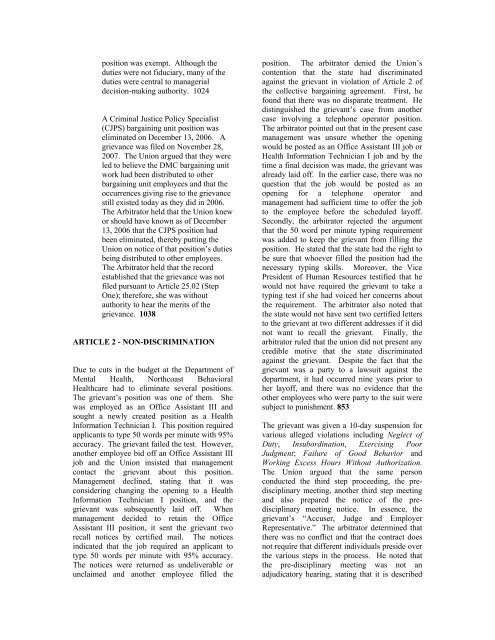by Contract Number (PDF) - OCSEA
by Contract Number (PDF) - OCSEA
by Contract Number (PDF) - OCSEA
Create successful ePaper yourself
Turn your PDF publications into a flip-book with our unique Google optimized e-Paper software.
position was exempt. Although the<br />
duties were not fiduciary, many of the<br />
duties were central to managerial<br />
decision-making authority. 1024<br />
A Criminal Justice Policy Specialist<br />
(CJPS) bargaining unit position was<br />
eliminated on December 13, 2006. A<br />
grievance was filed on November 28,<br />
2007. The Union argued that they were<br />
led to believe the DMC bargaining unit<br />
work had been distributed to other<br />
bargaining unit employees and that the<br />
occurrences giving rise to the grievance<br />
still existed today as they did in 2006.<br />
The Arbitrator held that the Union knew<br />
or should have known as of December<br />
13, 2006 that the CJPS position had<br />
been eliminated, there<strong>by</strong> putting the<br />
Union on notice of that position’s duties<br />
being distributed to other employees.<br />
The Arbitrator held that the record<br />
established that the grievance was not<br />
filed pursuant to Article 25.02 (Step<br />
One); therefore, she was without<br />
authority to hear the merits of the<br />
grievance. 1038<br />
ARTICLE 2 - NON-DISCRIMINATION<br />
Due to cuts in the budget at the Department of<br />
Mental Health, Northcoast Behavioral<br />
Healthcare had to eliminate several positions.<br />
The grievant’s position was one of them. She<br />
was employed as an Office Assistant III and<br />
sought a newly created position as a Health<br />
Information Technician I. This position required<br />
applicants to type 50 words per minute with 95%<br />
accuracy. The grievant failed the test. However,<br />
another employee bid off an Office Assistant III<br />
job and the Union insisted that management<br />
contact the grievant about this position.<br />
Management declined, stating that it was<br />
considering changing the opening to a Health<br />
Information Technician I position, and the<br />
grievant was subsequently laid off. When<br />
management decided to retain the Office<br />
Assistant III position, it sent the grievant two<br />
recall notices <strong>by</strong> certified mail. The notices<br />
indicated that the job required an applicant to<br />
type 50 words per minute with 95% accuracy.<br />
The notices were returned as undeliverable or<br />
unclaimed and another employee filled the<br />
position. The arbitrator denied the Union’s<br />
contention that the state had discriminated<br />
against the grievant in violation of Article 2 of<br />
the collective bargaining agreement. First, he<br />
found that there was no disparate treatment. He<br />
distinguished the grievant’s case from another<br />
case involving a telephone operator position.<br />
The arbitrator pointed out that in the present case<br />
management was unsure whether the opening<br />
would be posted as an Office Assistant III job or<br />
Health Information Technician I job and <strong>by</strong> the<br />
time a final decision was made, the grievant was<br />
already laid off. In the earlier case, there was no<br />
question that the job would be posted as an<br />
opening for a telephone operator and<br />
management had sufficient time to offer the job<br />
to the employee before the scheduled layoff.<br />
Secondly, the arbitrator rejected the argument<br />
that the 50 word per minute typing requirement<br />
was added to keep the grievant from filling the<br />
position. He stated that the state had the right to<br />
be sure that whoever filled the position had the<br />
necessary typing skills. Moreover, the Vice<br />
President of Human Resources testified that he<br />
would not have required the grievant to take a<br />
typing test if she had voiced her concerns about<br />
the requirement. The arbitrator also noted that<br />
the state would not have sent two certified letters<br />
to the grievant at two different addresses if it did<br />
not want to recall the grievant. Finally, the<br />
arbitrator ruled that the union did not present any<br />
credible motive that the state discriminated<br />
against the grievant. Despite the fact that the<br />
grievant was a party to a lawsuit against the<br />
department, it had occurred nine years prior to<br />
her layoff, and there was no evidence that the<br />
other employees who were party to the suit were<br />
subject to punishment. 853<br />
The grievant was given a 10-day suspension for<br />
various alleged violations including Neglect of<br />
Duty, Insubordination, Exercising Poor<br />
Judgment; Failure of Good Behavior and<br />
Working Excess Hours Without Authorization.<br />
The Union argued that the same person<br />
conducted the third step proceeding, the predisciplinary<br />
meeting, another third step meeting<br />
and also prepared the notice of the predisciplinary<br />
meeting notice. In essence, the<br />
grievant’s “Accuser, Judge and Employer<br />
Representative.” The arbitrator determined that<br />
there was no conflict and that the contract does<br />
not require that different individuals preside over<br />
the various steps in the process. He noted that<br />
the pre-disciplinary meeting was not an<br />
adjudicatory hearing, stating that it is described
















